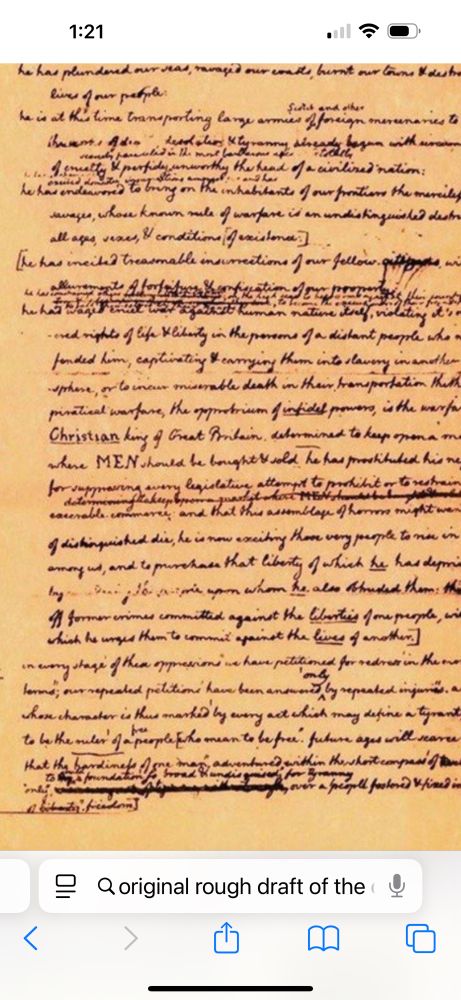Yes. Unquestionably. Read the original draft of the Declaration of Independence, esp page three, side by side with the introduction. Here’s a transcription www.loc.gov/exhibits/dec...
Replies
Here’s an image of page 3. The word MEN in all caps and italics refers to people captured and abducted in Africa and brought to England’s colonies in America. Match that up with page one, not only passages about “all men are created equal” but about rights. This is Jefferson’s handwriting.
This is great - the antislavery draft is such an interesting source and the handwriting point is a wonderful one. I still find it very hard to read even the draft generously given what TJ wrote 4-5 years later in Notes.
But elsewhere in the notes he also had a gradual abolition plan and separate reflections that god would stand with the enslaved in case of a rebellion. It begins: “I tremble when I reflect that god is just…”
Our exchange got me to thinking that I needed to look at recent writings on the Notes, and sure enough there is this fantastic paper by Cara Rogers (you may well know the paper) that I found really helpful on TJ's drafting of Notes and esp on slavery and race. 1/ muse.jhu.edu/pub/285/arti...
It nicely traces how the contradictions came up in drafting, how TJ's thinking of different audiences affected his choices, and on what sources he was working with. Just great stuff. 2/
An example. Here is Rogers on critical feedback TJ got on the scientific racism passage suggesting he omit it, and some changes he made (although also choosing to retain it). 3/
She also discusses how TJ revised Query XVIII, “Manners” where the "tremble for my country" passage you point to comes - showing how he was probably also responding to recently published pro-slavery arguments (Rogers 198-200). 4/
There's a lot more in the paper. But I really appreciate being pushed to look harder at this. Rogers, like you, sees a pretty consistent antislavery human rights theme in Notes. And 5/
...she and does a nice job of showing how Jefferson was working with that idea while also adopting the scientific racism of French encyclopedists. Ultimately she pushed against the "Jefferson's psyche" explanation, which I find a relief. 6/
I still wonder about the tension between human rights (where antislavery would fit) and political/civil rights implementations that enacted the racism, and I see both in the Declaration. But I have a better understanding of how that's working, at least for TJ, if not for others in 1776. end/
John Woolman's Journal has some similar reflections, foreshadowing dark things to come -- especially as he travels in the South. I've never been clear whether he meant imminent fears of slave revolts, or that long-term it wouldn't end well, or that God would judge harshly.
Also, the Declaration (not sure if this part is TJ) has a lot of "us" and "our" language in the specific rights/violations. I do not see the antislavery passage as including people of African descent in those first person plurals.
I can see a generalized human rights liberty/life opening claim that (for TJ) incorporated all people, including Africans, but a more limited specification of rights-in-political-society that depends on membership, which would not include (not equally, if at all) Africans (or Native Americans).
I am currently reading up on Jefferson and the Haitian Revolution, where he is similarly confounding and ends up choosing/acting poorly (non-recognition, embargo, etc) when presented with precisely the situation that made the antislavery version of the Declaration come to life fully.
I’m not saying he shouldn’t have done differently in 1802, but there *were* widespread massacres of former slave owners in Haiti—and while on some level those are understandable too, it’s a different situation. We are talking about 1776 and claims to human rights. And the “men” part is clear.




![Thomson was likely disappointed when Jefferson did not fully take his advice; Jefferson did not “expunge” the section on slavery in ancient Rome that Thomson worried would “comfort” American slaveholders “because,” as Thomson put it, “they do not treat [their slaves] as bad as others have done,” and Jefferson did not remove everything that supported white supremacy even though, in Thomson’s words, “such . . . opinion[s] might seem to justify slavery.”56 However, Jefferson did modify his conclusions in ways that seem designed to remove any doubt about his own antislavery views: he added “suspicion[s]” to replace white supremacist certainty; praisedAfricans’ morality; condemned slaveholders as thieves; and offered a sweeping critique of states that imagined they could remain both slaveholding and republican. By turning his attention to theways slavery corruptedmasters, turned innocent children into tyrants, and inevitably brought divine retribution, Jefferson rebuffed the claims of Virginians who believed slavery to be beneficial to both slaves and masters. He concurred with the critique of the Friend to Liberty, utilizing similar religious arguments, but he also addressed the foundational issue that prevented many white Virginians from imagining emancipation: their racist abhorrence of amalgamation. Colonization would solve all of Virginia’s problems, Jefferson said: it would serve as political restitution for the sins of slavery by forming a “free and independant” nation of former slaves, and it would preserve the “natural” division of the races.57](https://cdn.bsky.app/img/feed_thumbnail/plain/did:plc:7twvyhcy7wu6qrob7dp2v4ms/bafkreialgzavfdjzthjgc6qpaoq2iohxg66nhnvtmhgkfbbugriskxz2pq@jpeg)
